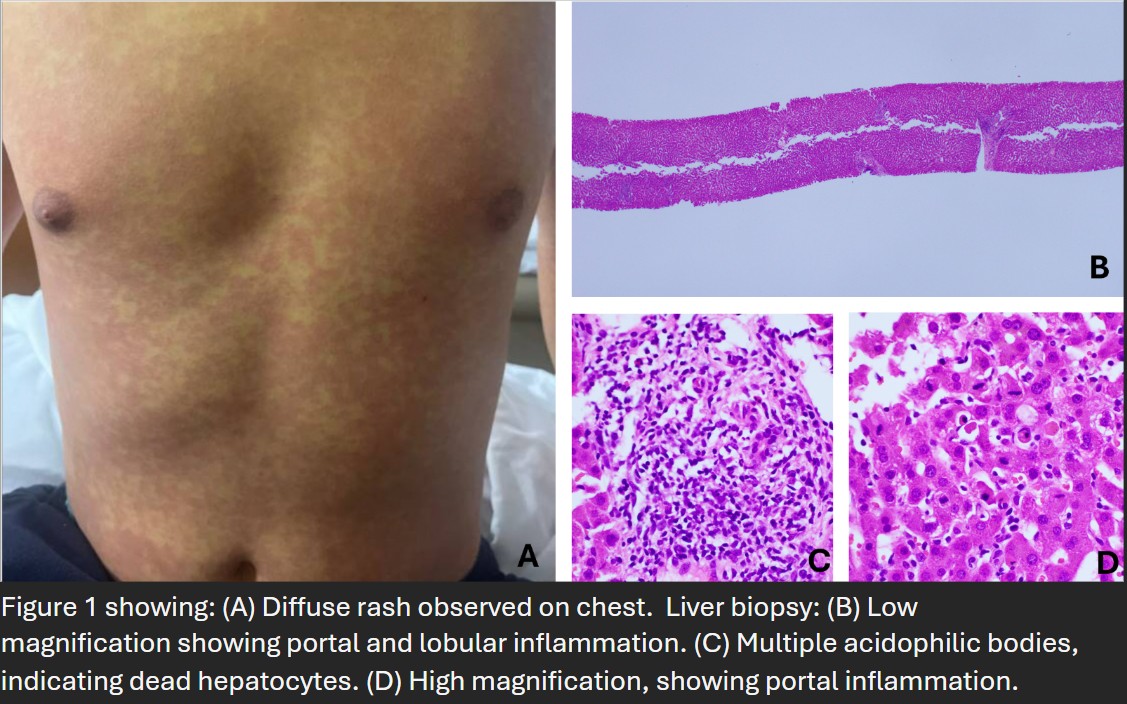Sunday Poster Session
Category: Liver
P1584 - DRESSed Up: A Rare Case of Aspirin-Induced DRESS Without Eosinophilia
Sunday, October 26, 2025
3:30 PM - 7:00 PM PDT
Location: Exhibit Hall

Patricia Guzman Rojas, MD, MS
University of Cincinnati
Cincinnati, OH
Presenting Author(s)
Patricia Guzman Rojas, MD, MS1, Alexander Dile, MD1, April Gettelfinger, MD1, Joshua Musalia, MD2, Tanner Thornsberry, MD3, Stephany Vittitow, MD1, Jiang Wang, MD, PhD1, Adam Myer, MD2, Kelsey Muchmore, PA-C1, Jacob Circillo, MD2, Amoah Yeboah-Korang, MD1
1University of Cincinnati, Cincinnati, OH; 2University of Cincinnati College of Medicine, Cincinnati, OH; 3University of Cincinnati Medical Center, Cincinnati, OH
Introduction: Drug reaction with eosinophilia and systemic symptoms (DRESS) syndrome is a severe drug-induced hypersensitivity reaction with significant hepatic implications, often presenting with acute liver injury alongside multi-organ involvement, fever, rash, and hematologic abnormalities. While eosinophilia is traditionally associated with DRESS, cases lacking eosinophilia pose a unique challenge in hepatology, as liver dysfunction may dominate the clinical picture.
Methods: A 33-year-old man with a history of Gilbert’s syndrome was hospitalized after a week of nausea, malaise and intermittent fevers up to 100.4°F. A few days prior, he developed a maculo-papular rash coalescing into patches, where tests showed abnormal aminotransferases (ALT 755 U/L, AST 520 U/L, ALP 204 U/L, and total bilirubin (TB) 14.0mg/dL) but normal blood counts. He reported taking azithromycin and acetaminophen-Aspirin-Caffeine combination for an upper respiratory infection which had since resolved. Infectious workup including viral hepatitis, HSV, EBV, CMV, HHV-6, HHV-7 and measles serologies, as well as autoimmune and fungal causes were ruled out. A liver doppler ultrasound was unremarkable. Patient's TB continued to rise up to a peak of 22.2. A skin biopsy showed vacuolar interface dermatitis compatible with DRESS syndrome. A subsequent liver biopsy identified acute hepatitis representing a likely drug-induced liver injury (DILI). Aspirin was thought to be the culprit of injury, with LiverTox Likelihood score: A[HD] (well-known cause of clinically apparent liver injury when given in high doses). Treatment with cyclosporine was initiated leading to improvement in aminotransferases (ALT 531, AST 169 and TB at 9.7) and resolution of the rash at time of discharge.
Results: .
Discussion: This case highlights the difficulty in diagnosing DRESS syndrome given the absence of peripheral eosinophilia, which emphasizes the need for heightened clinical suspicion in cases of unexplained hepatic dysfunction. Biopsy findings were critical in distinguishing DRESS-related hepatic injury from other causes of acute hepatitis. Emerging evidence supports cyclosporine as an effective immunomodulator in DRESS syndrome with liver involvement and hepatologists should consider early intervention with immunosuppressive agents to mitigate disease progression. This case underscores the complex interplay between drug hypersensitivity and hepatic injury, reinforcing the need for multidisciplinary collaboration.

Figure: Figure 1 showing: (A) Diffuse rash observed on chest. Liver biopsy: (B) Low magnification showing portal and lobular inflammation. (C) Multiple acidophilic bodies, indicating dead hepatocytes. (D) High magnification, showing portal inflammation.
Disclosures:
Patricia Guzman Rojas indicated no relevant financial relationships.
Alexander Dile indicated no relevant financial relationships.
April Gettelfinger indicated no relevant financial relationships.
Joshua Musalia indicated no relevant financial relationships.
Tanner Thornsberry indicated no relevant financial relationships.
Stephany Vittitow indicated no relevant financial relationships.
Jiang Wang indicated no relevant financial relationships.
Adam Myer indicated no relevant financial relationships.
Kelsey Muchmore indicated no relevant financial relationships.
Jacob Circillo indicated no relevant financial relationships.
Amoah Yeboah-Korang indicated no relevant financial relationships.
Patricia Guzman Rojas, MD, MS1, Alexander Dile, MD1, April Gettelfinger, MD1, Joshua Musalia, MD2, Tanner Thornsberry, MD3, Stephany Vittitow, MD1, Jiang Wang, MD, PhD1, Adam Myer, MD2, Kelsey Muchmore, PA-C1, Jacob Circillo, MD2, Amoah Yeboah-Korang, MD1. P1584 - DRESSed Up: A Rare Case of Aspirin-Induced DRESS Without Eosinophilia, ACG 2025 Annual Scientific Meeting Abstracts. Phoenix, AZ: American College of Gastroenterology.
1University of Cincinnati, Cincinnati, OH; 2University of Cincinnati College of Medicine, Cincinnati, OH; 3University of Cincinnati Medical Center, Cincinnati, OH
Introduction: Drug reaction with eosinophilia and systemic symptoms (DRESS) syndrome is a severe drug-induced hypersensitivity reaction with significant hepatic implications, often presenting with acute liver injury alongside multi-organ involvement, fever, rash, and hematologic abnormalities. While eosinophilia is traditionally associated with DRESS, cases lacking eosinophilia pose a unique challenge in hepatology, as liver dysfunction may dominate the clinical picture.
Methods: A 33-year-old man with a history of Gilbert’s syndrome was hospitalized after a week of nausea, malaise and intermittent fevers up to 100.4°F. A few days prior, he developed a maculo-papular rash coalescing into patches, where tests showed abnormal aminotransferases (ALT 755 U/L, AST 520 U/L, ALP 204 U/L, and total bilirubin (TB) 14.0mg/dL) but normal blood counts. He reported taking azithromycin and acetaminophen-Aspirin-Caffeine combination for an upper respiratory infection which had since resolved. Infectious workup including viral hepatitis, HSV, EBV, CMV, HHV-6, HHV-7 and measles serologies, as well as autoimmune and fungal causes were ruled out. A liver doppler ultrasound was unremarkable. Patient's TB continued to rise up to a peak of 22.2. A skin biopsy showed vacuolar interface dermatitis compatible with DRESS syndrome. A subsequent liver biopsy identified acute hepatitis representing a likely drug-induced liver injury (DILI). Aspirin was thought to be the culprit of injury, with LiverTox Likelihood score: A[HD] (well-known cause of clinically apparent liver injury when given in high doses). Treatment with cyclosporine was initiated leading to improvement in aminotransferases (ALT 531, AST 169 and TB at 9.7) and resolution of the rash at time of discharge.
Results: .
Discussion: This case highlights the difficulty in diagnosing DRESS syndrome given the absence of peripheral eosinophilia, which emphasizes the need for heightened clinical suspicion in cases of unexplained hepatic dysfunction. Biopsy findings were critical in distinguishing DRESS-related hepatic injury from other causes of acute hepatitis. Emerging evidence supports cyclosporine as an effective immunomodulator in DRESS syndrome with liver involvement and hepatologists should consider early intervention with immunosuppressive agents to mitigate disease progression. This case underscores the complex interplay between drug hypersensitivity and hepatic injury, reinforcing the need for multidisciplinary collaboration.

Figure: Figure 1 showing: (A) Diffuse rash observed on chest. Liver biopsy: (B) Low magnification showing portal and lobular inflammation. (C) Multiple acidophilic bodies, indicating dead hepatocytes. (D) High magnification, showing portal inflammation.
Disclosures:
Patricia Guzman Rojas indicated no relevant financial relationships.
Alexander Dile indicated no relevant financial relationships.
April Gettelfinger indicated no relevant financial relationships.
Joshua Musalia indicated no relevant financial relationships.
Tanner Thornsberry indicated no relevant financial relationships.
Stephany Vittitow indicated no relevant financial relationships.
Jiang Wang indicated no relevant financial relationships.
Adam Myer indicated no relevant financial relationships.
Kelsey Muchmore indicated no relevant financial relationships.
Jacob Circillo indicated no relevant financial relationships.
Amoah Yeboah-Korang indicated no relevant financial relationships.
Patricia Guzman Rojas, MD, MS1, Alexander Dile, MD1, April Gettelfinger, MD1, Joshua Musalia, MD2, Tanner Thornsberry, MD3, Stephany Vittitow, MD1, Jiang Wang, MD, PhD1, Adam Myer, MD2, Kelsey Muchmore, PA-C1, Jacob Circillo, MD2, Amoah Yeboah-Korang, MD1. P1584 - DRESSed Up: A Rare Case of Aspirin-Induced DRESS Without Eosinophilia, ACG 2025 Annual Scientific Meeting Abstracts. Phoenix, AZ: American College of Gastroenterology.
